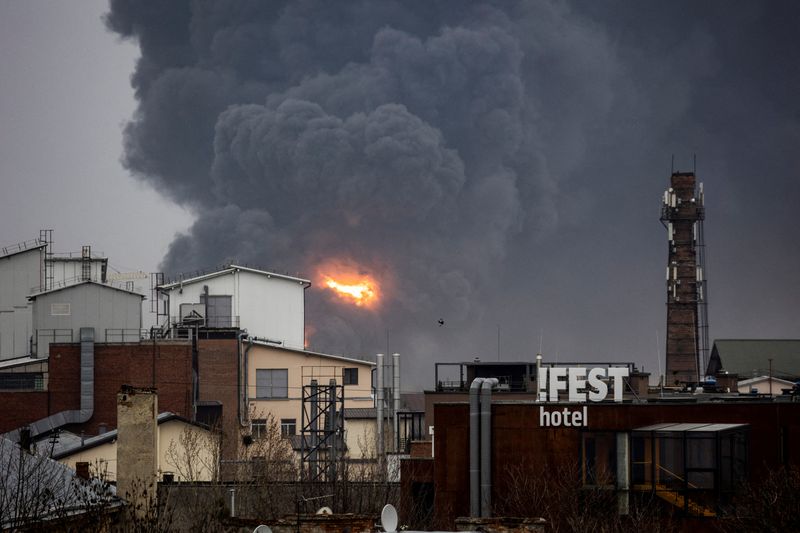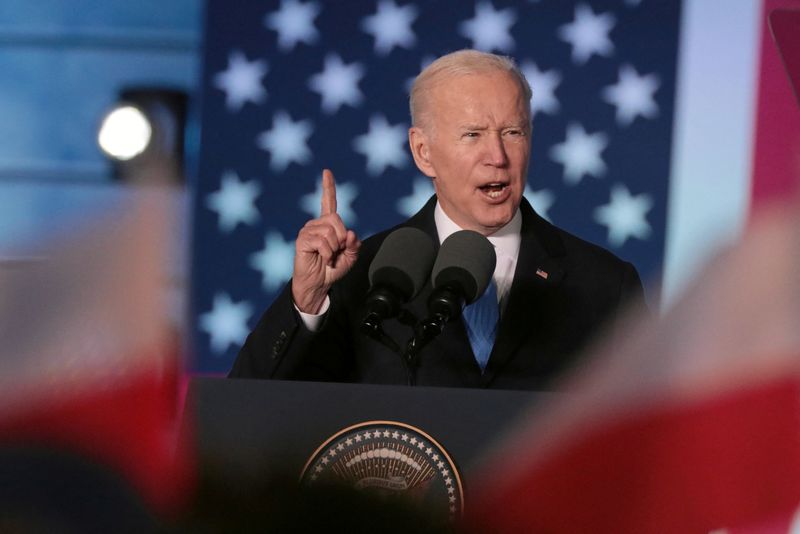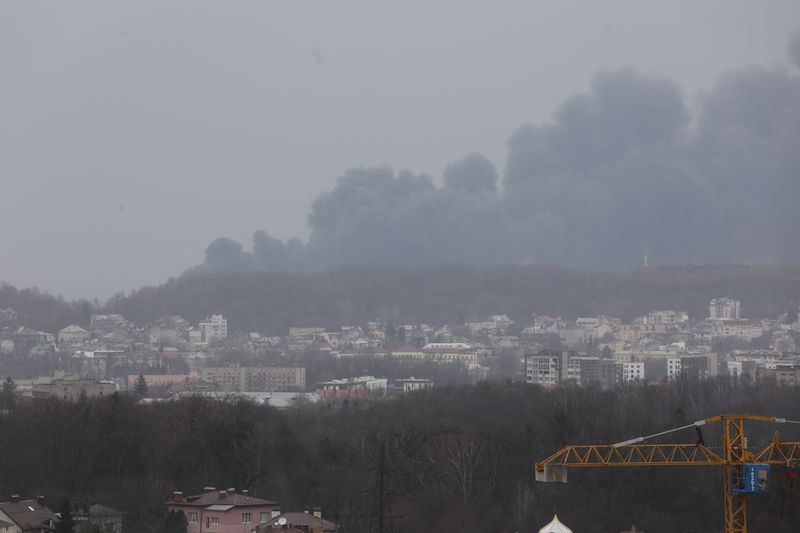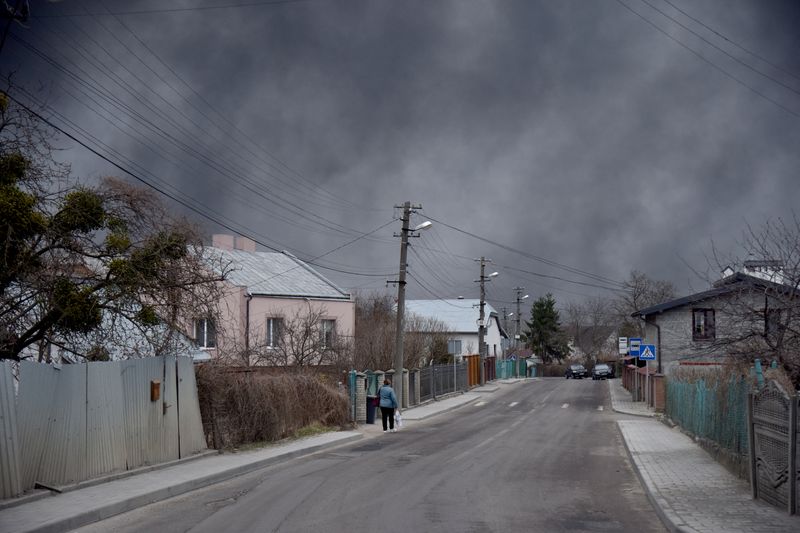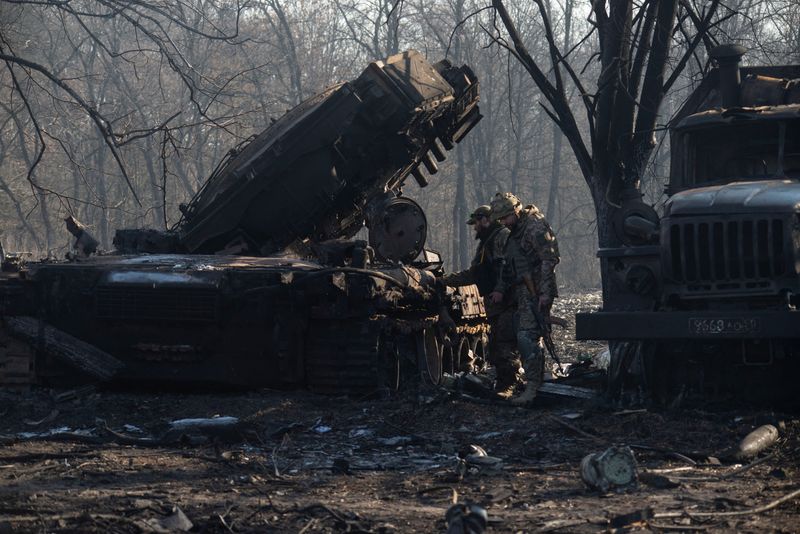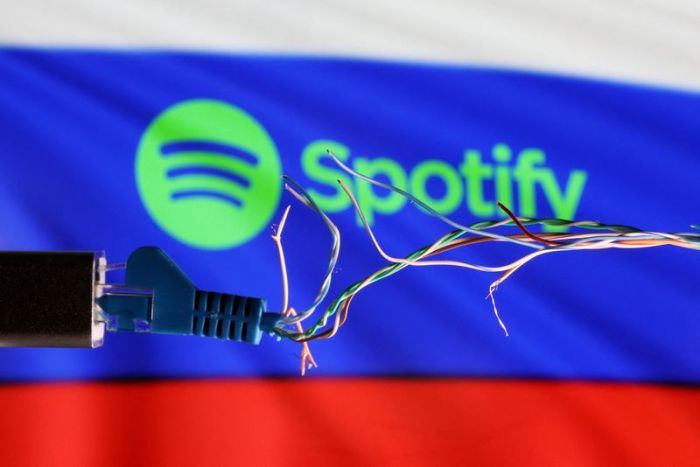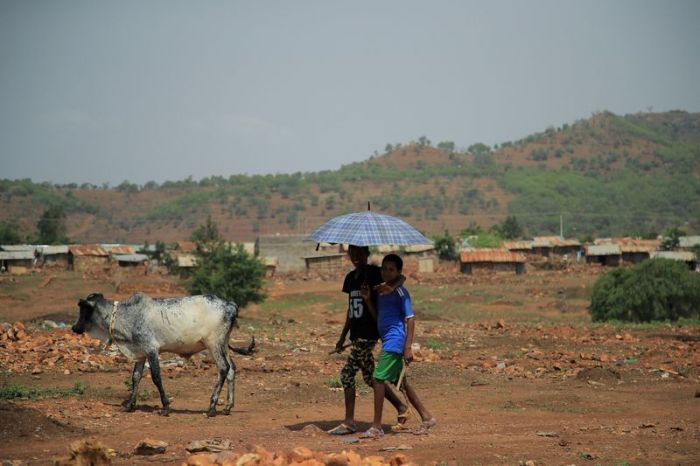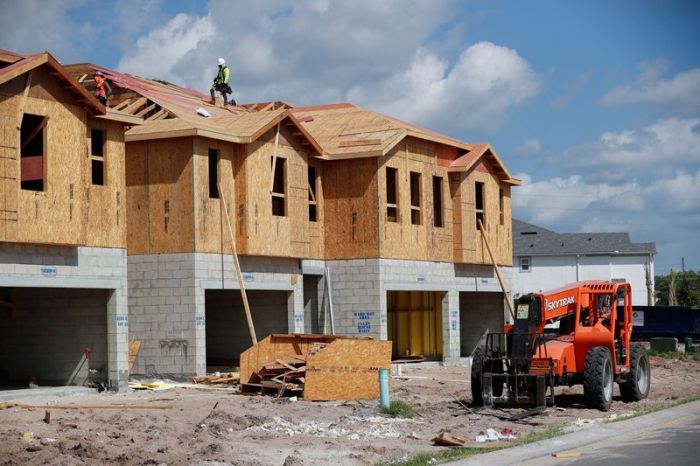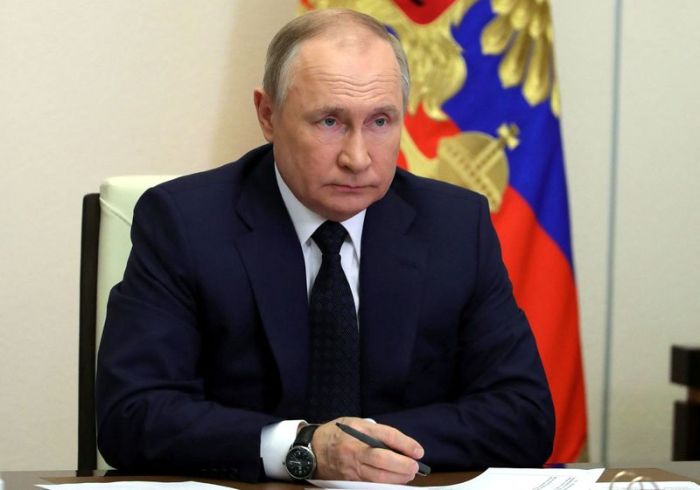LVIV, Ukraine and WARSAW (Reuters) -Rockets struck the western Ukrainian city of Lviv on Saturday, signalling a potential new front in Moscow’s invasion as U.S. President Joe Biden decried Russian President Vladimir Putin’s grip on power and sought to steel Europe for a long fight ahead.
Intense fighting raged in several parts of Ukraine, suggesting there will be no swift let-up in the month-old war while Biden framed the fight as part of the historic struggle for democratic freedoms in a major address from Poland as he concluded his European trip aimed at bolstering Western resolve.
“For God’s sake, this man cannot remain in power,” Biden said in Warsaw. A White House official later said Biden was not urging regime change but was saying “Putin cannot be allowed to exercise power over his neighbors or the region.”
The Kremlin dismissed Biden’s comment, saying it was “not for Biden to decide.”
After more than four weeks of fighting, Russia has failed to seize any major Ukrainian city and the conflict has killed thousands of people, sent nearly 3.8 million abroad and driven more than half of Ukraine’s children from their homes, according to the United Nations.
Moscow signalled on Friday it was scaling back its military ambitions to focus on territory claimed by Russian-backed separatists in eastern Ukraine, while Ukrainian President Volodymyr Zelenskiy on Saturday implored the West to speed up military aid.
Four rockets on Saturday hit the outskirts of Lviv, some 60 km (40 miles) from the border with Poland just before Biden delivered his remarks in Warsaw.
The attack appeared to be the first time the western Ukrainian city was struck after so far escaping the heavy bombardment that has devastated other cities closer to Russia.
Regional Governor Maksym Kozytskyy said five people had been wounded and residents were told to head to shelters after an initial strike hit mid-afternoon. Reuters witnesses saw black smoke rising from the northeast side of the city and Lviv’s mayor said an oil storage facility had been hit.
Ukrainian officials later reported another strike significantly damaged Lviv’s infrastructure but that so far there were no reported deaths.
Russian forces also seized Slavutych, a town where workers at the nearby defunct Chernobyl nuclear plant live, and three people were killed, Interfax Ukraine news agency quoted the local mayor as saying.
Ukrainian staff have continued to work at Chernobyl after the plant was seized by Russian forces, and the International Atomic Energy Agency (IAEA) has expressed alarm about the situation if workers are unable to rotate.
Russian forces also fired at a nuclear research facility in the city of Kharkiv, the Ukrainian parliament said in a Twitter post on Saturday.
In the encircled southern city of Mariupol, Mayor Vadym Boichenko said the situation remained critical, with street fighting in the centre. Mariupol has been devastated by weeks of Russian fire.
UKRAINE KEPT WAITING
A visibly irritated Ukrainian President Volodymyr Zelenskiy, in his nightly address, again demanded Western nations send military hardware and asked whether they were intimidated by Moscow, saying, “We’ve already been waiting 31 days.”
Zelenskiy also expressed disappointment over the lack of transferred aircraft in a call with Polish counterpart Andrzej Duda on Saturday, Zelenskiy’s office said. Washington had rejected a surprise offer by Poland to transfer Russian-made MiG-29 fighter jets to a U.S. base in Germany to replenish Ukraine’s air force.
The United States, which has already pledged billions in aid, will give an additional $100 million for field gear and other civilian security assistance for Ukraine’s border guard and police, it announced Saturday.
Zelenskiy earlier compared Mariupol’s devastation to the destruction inflicted on the Syrian city of Aleppo by combined Syrian and Russian forces in Syria’s civil war, speaking to Qatar’s Doha Forum via video link.
He also warned of dire consequence if his country – one of the world’s major grains producers – could not export its foodstuffs and urged energy-producing countries to boost output so Russia cannot use its oil and gas wealth to “blackmail” other nations.
BIDEN IN POLAND
Biden earlier on Saturday sharpened his tone calling Putin a “butcher” after meeting Ukrainian refugees in Poland — a comment the Kremlin was cited by Russia’s TASS news agency as saying would further damage prospects for mending Russian-U.S. ties.
Biden also saw Ukrainian Foreign Minister Dmytro Kuleba and Defence Minister Oleksii Reznikov in the Polish capital Warsaw in his first face-to-face meeting with top Ukrainian officials since the start of the war.
Biden’s visit to Poland was his final stop on a trip to Europe that has underscored his opposition to the Russian invasion, his solidarity with Ukraine and his determination to work closely with Western allies to confront the crisis.
“We need to be clear-eyed. This battle will not be won in days or months … We need to steer ourselves for a long fight ahead,” Biden said in his speech. He also urged Europe to accelerate the shift to cleaner renewable energy and wean itself off Russian oil and gas.
Zelenskiy pushed late on Friday for further talks with Russia after its defence ministry said a first phase of its operation in Ukraine was mostly complete and that it would now focus on the Donbass region bordering Russia, where Russian-backed forces have been fighting pro-government forces since 2014.
Reframing Russia’s goals may make it easier for Putin to claim a face-saving victory, analysts said.
Moscow has until now said its goals for what it calls its “special military operation” include demilitarizing and “denazifying” its neighbour. Ukraine and its Western allies have called that a baseless pretext for an unprovoked invasion.
“It’s a lie,” Biden said. “Russia has strangled democracy — has sought to do so elsewhere, not only in its homeland.”
The United Nations has confirmed 1,104 civilian deaths and 1,754 injuries in Ukraine since the Feb. 24 invasion but says the real toll is likely higher. Ukraine says 136 children have been killed.
Russia’s defence ministry said 1,351 Russian soldiers had been killed and 3,825 wounded, the Interfax news agency reported on Friday. Ukraine says 15,000 Russian soldiers have been killed. Reuters could not independently verify the claims.
LAID WASTE
Footage from Mariupol, home to 400,000 people before the war, showed destroyed buildings, burnt out vehicles and shell-shocked survivors venturing out for provisions. Residents have buried victims in makeshift graves as the ground thaws.
“It’s scary, I don’t know how we’re going to survive,” an elderly woman resident said, declining to identify herself by name. “We’re lying there, hoping they won’t bomb us. Look at how many dead bodies we’ve buried around the building.”
To the north, battle lines near the capital Kyiv have been frozen for weeks with two main Russian armoured columns stuck northwest and east of the city.
The Russian defence ministry said its troops had seized a dug-in command centre in a Kyiv suburb and captured more than 60 Ukrainian servicemen. Reuters could not immediately verify this.
The general staff of the Ukrainian armed forces on Facebook said Russia’s losses were such that Moscow was conducting “hidden mobilizations” and taking battle tanks out of long-term storage.
A British intelligence report said Russian forces were relying on indiscriminate bombardments rather than risk large-scale ground operations, a tactic the report said could limit Russian military casualties but would harm more civilians in Ukraine. A later report cited a 60% failure rate among such Russian munitions.
(Reporting by Reuters journalists in Mariupol, Natalia Zinets and Maria Starkova in Lviv, Jarrett Renshaw in Warsaw; Trevor Hunnicutt in Washington; Humeyra Pamuk in Tel Aviv; David Ljunggren in Ottawa; Alessandra Prentice, Michael Holden and Reuters bureaus worldwide, Writing by Lincoln Feast, Crispian Balmer; John Davison and Susan Heavey; Editing by William Mallard, Frances Kerry, Timothy Heritage and Nick Zieminski)

